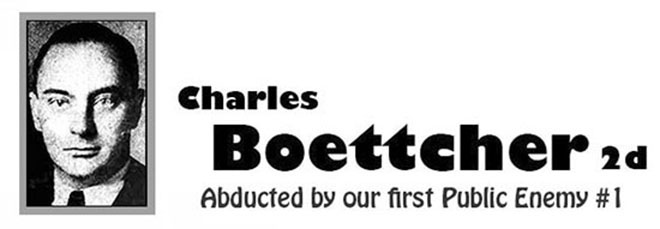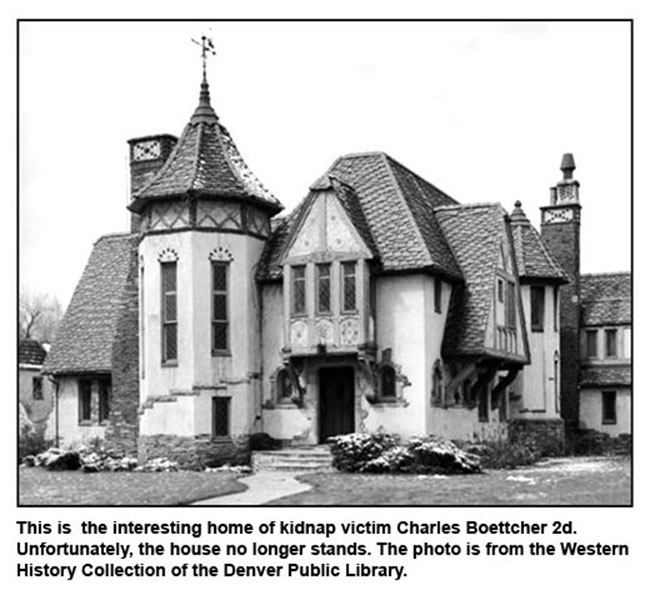
|
It is unlikely that many people can identify the USA's first public enemy number one.
I'll get to the answer, but, first, a newspaper story about his most-famous crime — the abduction of Charles Boettcher 2d. It was staged so efficiently that it became the blueprint for other kidnappers.
The kidnapping of Charles Boettcher was the main reason that the man who planned and executed the crime was the first person considered the country's number one public enemy. Unlike other gangsters of the era, this man remains relatively unknown, ignored by movie makers in favor of the likes of John Dillinger and Bonnie and Clyde.
|
Syracuse Journal, February 13, 1933
Denver Broker Held for $60,000 Ransom
DENVER (INS) — Efficient, organized and desperate abductors kidnapped Charles Boettcher II, wealthy broker and friend of Colonel Charles A. Lindbergh, early today for $60,000 ransom.
Boettcher and his wife were returning to their fashionable home early this morning. Boettcher started to put his automobile in the garage when two men appeared:
“Come here, Charlie, and stick up your hands,” one of the kidnappers. said, flashing a revolver. “Do as you’re told and everything will be all right.”
They hastily handed Mrs. Boettcher a note, then sped away. The note, containing the ransom demand, said:
“Don’t notify police. Tell Claude Boettcher (the victim’s father) he had better get $60,000 for ransom. He better do business. Follow instructions. Don’t forget the Lindbergh baby would still be alive if the ransom had been paid. Insert a personal ad in the newspapers stating ‘Ready to come home, please write.’ ”
The note was typewritten on a piece of plain white paper.
The kidnap victim is an enthusiastic supporter of airplane activities. His connection with flying brought him to close friendship with Colonel Lindbergh, who was a dinner guest at his home following the flight to Paris.
He also was host to the flying colonel on Lindbergh’s last visit to Denver. He is president of Lowry Airport, Inc., and a director of the Mid-Continent Air Express Company.
Boettcher, only 32, is a graduate of Yale and had been associated in the investment and brokerage business with his father for the past eight years.
Mrs. Boettcher told police she remained in the car. Horror-stricken and in delicate health, she had advised her husband not to resist.
A second bandit appeared. After passing the note to his wife, the kidnappers ordered Boettcher into a small, dark sedan that stood at the curb; then they disappeared.
As evidence of the careful planning of the abductors, police found that wires had been tapped near the home of the victim’s father.
Boettcher is a member of one of Colorado’s wealthiest families. His grandfather, Charles Boettcher, founded the sugar and cement industries in this district.
Young Boettcher’s marriage to Miss Anna Lou Pigott of Helena, Montana, was an outstanding event in Denver society. They have a daughter, Anna Lou, 5. |
|
| |
In a development not uncommon in kidnapping cases during the 1930s, police received help from known or suspected local criminals, though many days would pass without results.
|
| |
Syracuse Journal, February 14, 1933
Mobsters Help Police Look for Boettcher
By DOROTHY BATTLE
DENVER (INS) — Police reports say underworld forces are working surreptitiously to effect the safe return of Charles Boettcher II, wealthy young Denver broker, kidnapped Sunday night and held for $60,000 ransom.
Mrs. Anna Lou Boettcher, the kidnap victim’s beautiful blonde wife, today, in an exclusive interview with International News Service, denied that she personally had communicated with Joseph P. Roma*, Colorado’s “bantam booze baron,” in an effort to find her husband, but admitted that a friend may have done so.
When questioned, Roma was evasive about his purported efforts to enlist his aid. He said he had enough troubles already and did not want to antagonize law officers who are working day and night on the case.
Mrs. Boettcher, exhausted with fear and suspense, is confined to her bed under constant care of a physician, a nurse and her aunt. She is expecting the birth of her second child next month.
With detectives, Mrs. Boettcher studied the pictures of suspects in the kidnapping, which she witnessed, but it could not be learned whether she had positively identified any photograph as that of the man, who, after presenting her with a note demanding $60,000 ransom, forced her husband into a waiting automobile in the driveway of their home.
Apprehension of the kidnappers was predicted today as imminent by Police Chief A. T. Clark, who said he thinks he knows the “master mind” behind the abduction of Boettcher, and expects to arrest the criminal within 48 hours.”
Federal authorities joined with hundreds of police in a search for clues, and governors of four states — Colorado, Wyoming, Utah and New Mexico— issued formal appeals to citizens to maintain a watch for suspects.
The kidnappers have not accepted a virtual invitation from the family to open negotiations for payment of the $60,000 ransom. Members of the family refused to admit it, but it was believed they placed an ad in a local newspaper indicating they were prepared to deal with the abductors. This was in compliance with a demand contained in the ransom note. |
|
* Joseph P. Roma, the “booze baron” mentioned above, was murdered a few days later. His murder was unrelated to the kidnapping case.
|
| |
After being held captive for 17 days, Charles Boettcher was let out of a car on the outskirts of Denver on the evening of March 1. His hands were free, but his first order of business was removing adhesive tape from his eyes. He found a drugstore and called his father, who had paid a $60,000 ransom. |
| |
Syracuse Journal, March 2, 1933
Boettcher Freed, Slips Past
Crowd Outside House
DENVER (INS) — Held captive by abductors for 17 days, Charles Boettcher 2nd, 31, wealthy Denver broker, was safe in his palatial home today after payment by his millionaire father of a $60,000 ransom.
Boettcher’s release came as swiftly and dramatically as did his sensational abduction shortly before midnight on Sunday, February 13.
He was wan and tired-looking when he arrived home two hours after his release. His eyes were red and swollen from almost constant wearing of bandages and adhesive tape. He declared, however, that he had not been mistreated by his captors. Except for loss of sleep and worry through the 17-day ordeal of blindfolded imprisonment, his physical condition was not affected by the experience.
Claude K. Boettcher, father of the kidnap victim, admitted payment of the ransom, but refused to give any details. International News Service learned from unimpeachable sources that the $60,000 was tossed out of an automobile near a culvert 10 miles east of Denver by an emissary of the family less than half an hour before the heir to millions was let out of an automobile in East Denver.
The victim’s father, hostile even to the point of drawing a gun when approached by a horde of newspapermen shortly after young Charles’ release, agreed to give a statement to the press later today.
Young Boettcher, after a trip which he estimated began Tuesday night, was let out of a car on the outskirts of Denver yesterday evening. After removing the adhesive tape from his eyes, he found a drugstore telephone and called his father, who notified police.
The meeting between Boettcher and his beautiful, blonde wife, Mrs. Anna Lou Boettcher, was dramatic. Mrs. Boettcher, soon to become a mother for the second time, was informed with a minimum of excitement of his return.
While she sat tensely at home, the house, in an exclusive residential section, was surrounded by crowds of curious persons, who packed the lawn.
Suddenly, at the side entrance, where the crowd was least congested, a coupe drew up and two men darted through into the shelter of the house.
One was fresh-faced and dapperly dressed — Dr. John M. Foster, family physician and intimate friend of the kidnapped broker. But the other’s features were marred by a stubbly beard and some spots about the swollen eyes. The crowd did not recognize Charles Boettcher until he already was inside.
Mrs. Boettcher ran to meet him and they threw their arms about each other, with happy cries and broken words of affection. |
|
| |
Police decided the crime was the work of Verne Sankey, who, as a result of this kidnapping, was the country's first public enemy number one.
No doubt he'd be better remembered if he had had a catchy nickname, such as "Verne the Mastermind" or "The Genius" or "Venomous Verne," or, simply, "Snake."
A gangster with a catchy name, "Machine Gun" Kelly, would soon follow Sankey's plan by kidnapping Oklahoma oilman Charles F. Urschel, a case that would attract a lot more attention as the year went on.
Meanwhile, the kidnapping of Boettcher took a bit longer to solve, thanks to the elusiveness of Sankey.
As for for victim, Charles Boettcher 2nd died in 1963 in San Francisco. He was 62 years old.
His first wife, Anna Lou, who had prolonged health problems, took her own life in 1941, shooting herself in the head. A few years later, Boettcher married Mae Scott Foster and they divided their time between homes in San Francisco and Hawaii.
Boettcher’s grandfather, Charles, ran several Colorado businesses, including sugar beet, cement and stockyards industries.
The Boettcher family, including Claude (son of Charles 1st, father of Charles 2nd), were well known for their three Denver mansions. The one from which Charles Boettcher 2d was kidnapped was at 777 Washington Street. Built in 1920, the house was sold in the early 1950s and was operated for awhile as a small hotel. In 1956 it was raided by police who uncovered a gambling operation in the basement.
Soon the building was declared a public nuisance and was demolished in 1963 — the year of Boettcher’s death — and a high-rise apartment building went up.
|
 |
| |
| HOME • CONTACT |
| |
|


